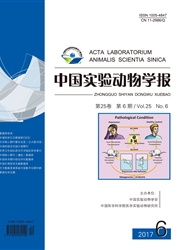

 中文摘要:
中文摘要:
丙型肝炎病毒(HCV)感染是导致人类慢性病毒性肝炎、肝硬化和肝癌的最主要病因之一。由于缺乏合适的HCV感染实验动物模型,使得针对HCV感染更为有效的疗法及疫苗的研发滞后。黑猩猩是HCV感染研究的最佳实验动物,但由于其来源有限、价格昂贵及临床症状等诸多问题,其应用受限,因此发展新的实验动物模型用于HCV感染相关的基础和应用研究迫在眉睫。近年来,以啮齿类等动物为替代模型取得了不少进展,应用转基因等实验技术使替代动物感染了HCV,并成功应用于多个学科领域的研究。本文分析了HCV自然感染的实验动物、自然感染和非自然感染的替代实验动物在致病机制研究、药物评价和疫苗研发应用中的优缺点及未来研究趋势。
 英文摘要:
英文摘要:
Hepatitis C virus ( HCV) is a leading cause of chronic hepatitis, cirrhosis, and hepatocellular carcino-ma in humans.Due to the lack of suitable experimental animal models for HCV infection, the development of more effective treatment of HCV infection and vaccines has been delayed.Chimpanzee is the best experimental animal model for the re-search of hepatitis C virus ( HCV) infection.However, because of its limited in resource, expensive in breeding, and difference in clinical symptoms, thus developing new experimental animal models for HCV-related basic and applied re-search is imminent.In recent years, as a surrogate animal model, the development of rodent model and other models has been achieved a lot of progress.Using such as genetically modified experimental techniques, those surrogate animals were infected with HCV in vivo and were successfully applied to research in several areas.In this review, we will focus on the a-chieved progress in naturally infected animal model and transgenic surrogate experimental models, and their advantage and limitation in usage in study on the pathogenetic mechanism of infection, drug evaluation and development of vaccines, and will also discuss the future direction of development of experimental animal models for research of infection with HCV.
 同期刊论文项目
同期刊论文项目
 同项目期刊论文
同项目期刊论文
 期刊信息
期刊信息
